
What are Entities in SEO?
In SEO, an entity is a person, place, thing, or concept that search engines can recognize and understand. You can think of an entity as something that has a clear meaning on its own.
For example, if you search for "Apple", you could be looking for information on the fruit or the tech company, so how does Google know which one you're looking for?
Google uses entities to figure out which one you're talking about based on the context of the entire page.
Entities are the reason why Google can answer questions, show Knowledge Panels, and link related topics together.
Instead of just matching words, search engines now focus on meaning.
In this blog post, we will take a closer look at how search engines use entities to deliver accurate search results, the different types of entities that exist, and lastly, how to optimize your website for entity SEO.
We also spoke to some leading digital marketers on how they optimize their websites for entity SEO, you’ll find their insights all throughout this post.
Before we begin, I’d like to thank the following people for adding their valuable insights:
- Mary Sahagun, Founder at TargetLink, Singapore
- Brianna Strouse, SEO Manager at LevLane Advertising, Pennsylvania, United States
- Georgi Todorov, Founder and CEO at Create & Grow, Bulgaria
- Baruch Labinski, CEO at Rank Secure, Toronto, Canada
- Jase Rodley, Independent SEO Consultant
Importance of Entities in Modern SEO
Search engines have changed a lot over the years. In the past, Google focused mainly on keywords.
So if you typed "best pizza in New York," Google would look for pages that had those exact words on them.
Now, Google doesn’t just match words. It tries to understand meaning and search intent.
This shift happened because people search in different ways.
Someone might type "best pizza in NYC," while another person asks, "Where can I get great pizza in New York?" Even though the words are different, the intent is the same.
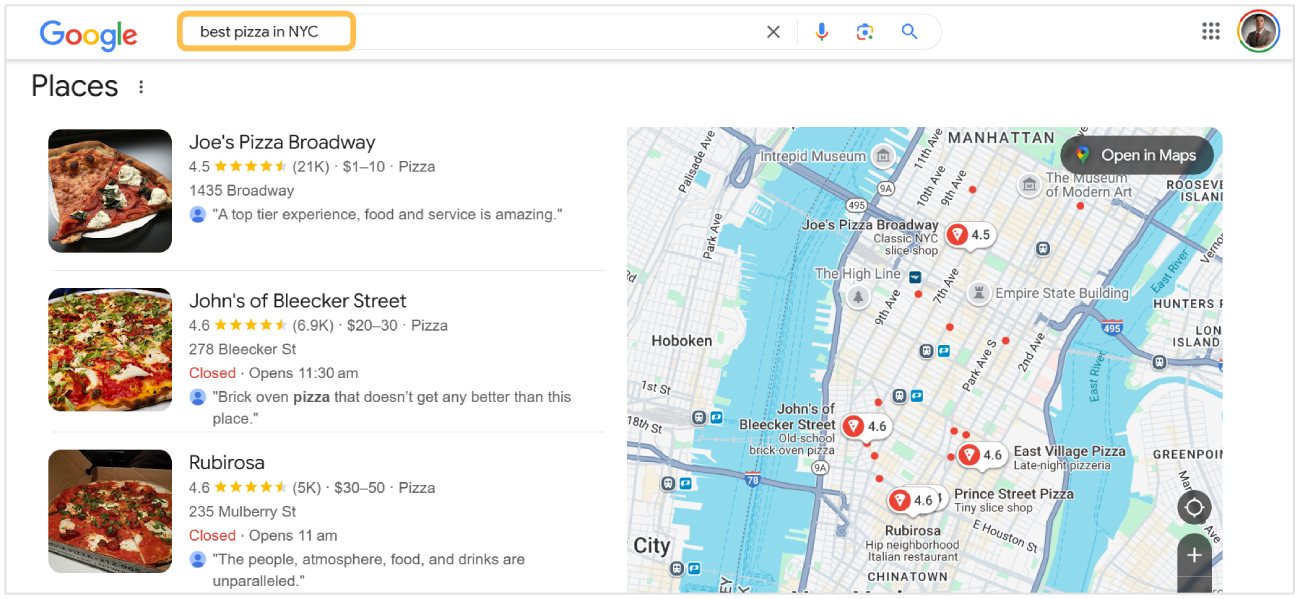
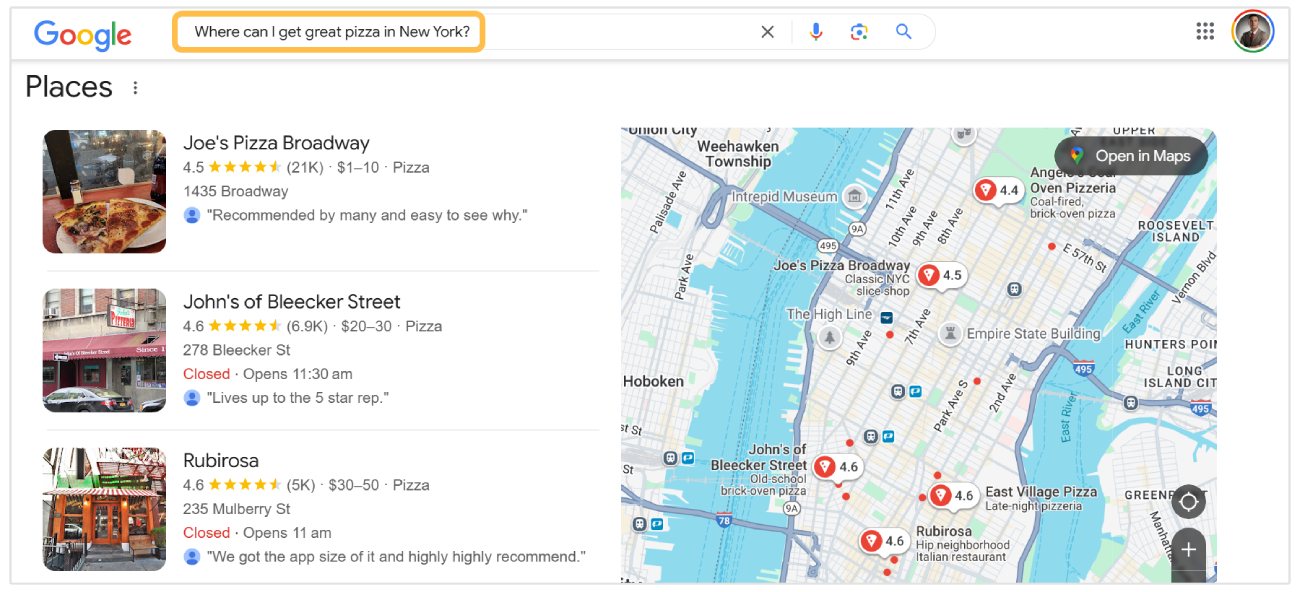
Not to mention, SEOs were able to game the system by just placing target keywords on the relevant page(s) and then ranked for those page.
Entities help Google connect the dots. Instead of relying only on keywords, Google looks at the bigger picture. It understands that "New York" is a location and "pizza" is a type of food. It can also recognize specific pizza restaurants as entities.
This is important for SEO because:
- Better Search Results: Google can deliver more accurate answers based on meaning, not just matching words.
- Voice Search & AI: People now search using voice assistants. Instead of typing "weather Cape Town," they ask, "What's the weather like in Cape Town today?" Entities help search engines understand these natural-language questions.
- Knowledge Panels & Featured Snippets: When you search for a famous person or brand, Google shows a detailed info box. This happens because Google treats these as entities.
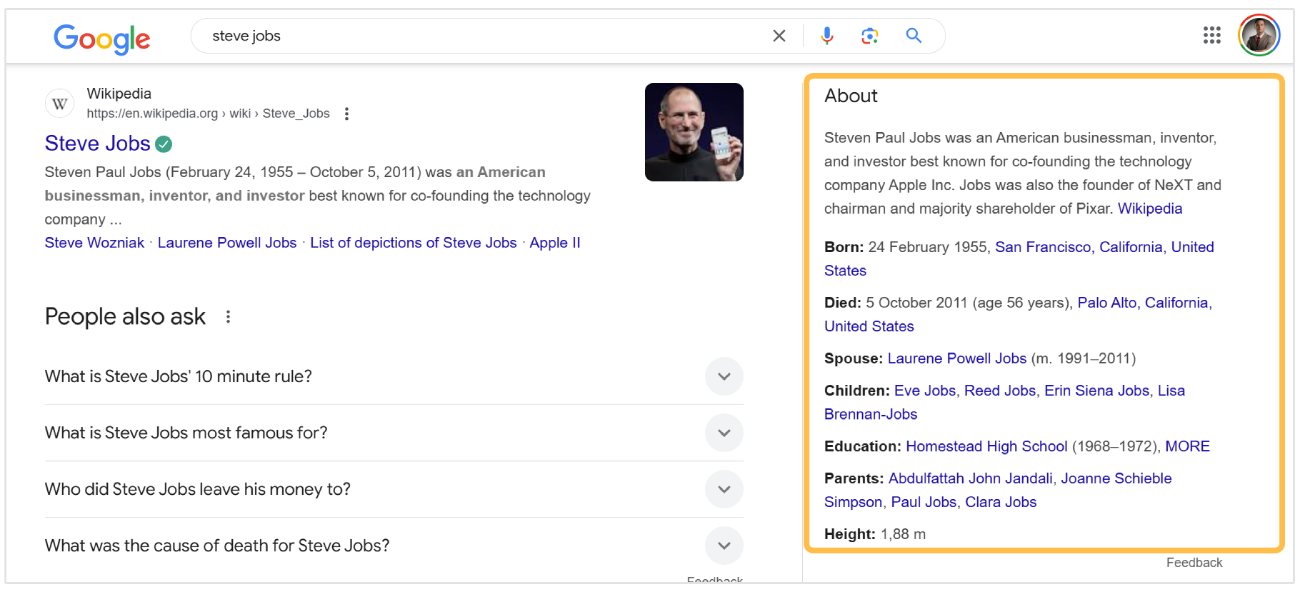
- Stronger Content Connections: Google links related topics together. If your website talks about Elon Musk, it might also show related searches about Tesla and SpaceX because they are all connected entities.
By focusing on entities, Google makes search results more useful and relevant. For website owners, this means that optimizing for entities (not just keywords) is key to better rankings.
How Search Engines Use Entities
Search engines use entities to understand the meaning behind words and how different concepts relate to each other. Instead of just matching keywords, Google builds a network of entities and their connections.
Here’s how it works:
1. Google’s Knowledge Graph
The Knowledge Graph is Google’s massive database of entities and their relationships. It helps Google understand the meaning of words beyond their literal definition.
For example, when you search for “Barack Obama,” Google knows he is:
- A person (entity type)
- The former U.S. president (relationship)
- Connected to other entities like Michelle Obama, the White House, and Democratic Party (entity associations)
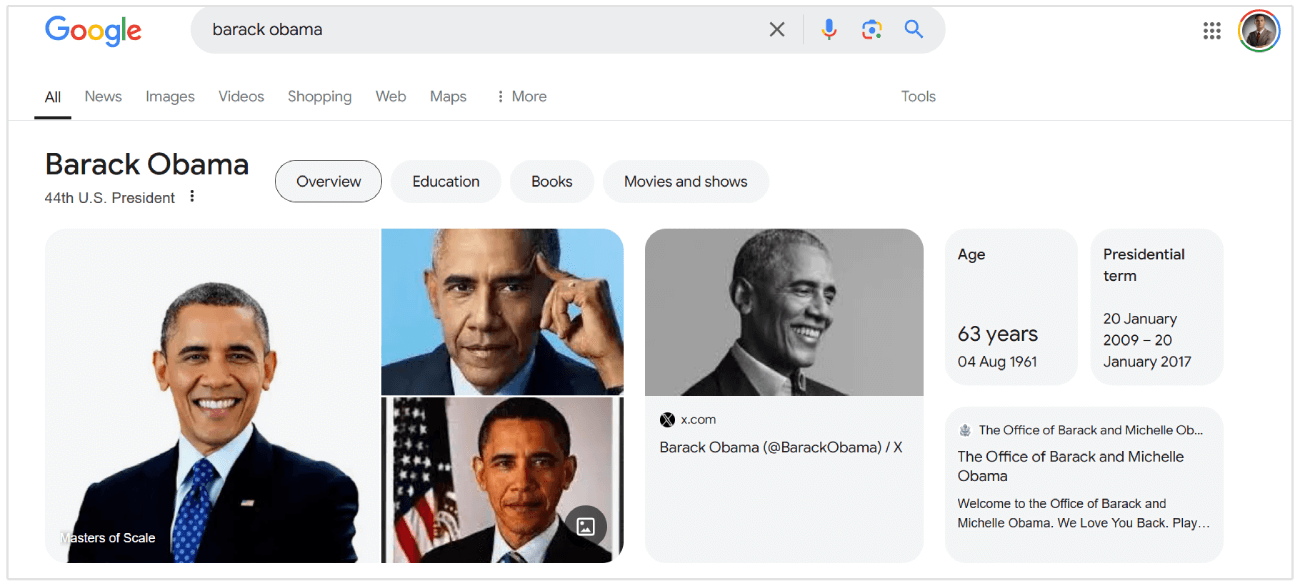
This is why Google can show a Knowledge Panel with relevant information instead of just listing webpages with his name.
2. Entity Recognition
Entities help search engines figure out what you mean, even when words have multiple meanings.
For example, if you search for "Jaguar," Google needs to determine:
- Are you talking about the animal?
- Or the car brand?
To do this, Google looks at context signals:
- If your query includes any reference to wildlife, it assumes you mean the animal.
- If it includes something dealing with the automotive industry, it assumes you mean the vehicle brand.
This process is called entity disambiguation, and it ensures search engines return the most relevant results.
3. Connecting Entities for Smarter Search
Google doesn’t just recognize entities—it links them together.
For example, if you search for “Leonardo da Vinci”, Google understands that he is connected to:
- The Mona Lisa (his artwork)
- Renaissance (the historical period)
- Italy (his country of origin)
This allows Google to provide related searches, featured snippets, and knowledge panels that give users a more complete answer.
4. Entity-Based Ranking Signals
Entities also play a role in ranking search results.
Baruch Labunski, CEO at Rank Secure - a Toronto based SEO agency, says that relevance and authority play a big role in entity SEO.
When search engines look at entity SEO, they look at relevance and authority. Improving the helpfulness and trustworthiness of your site becomes highly important.
- Baruch Labinski, CEO at Rank Secure
SEOs and marketers need to consider the following questions regarding their content and pages when thinking of entity SEO:
- Is it well-known or widely cited? (Authority)
- How closely does the entity match the search intent? (Relevance to the query)
- How does this entity connect to other relevant topics? (Contextual relationships)
By understanding these connections, Google can rank results based on meaning, not just keyword usage.
5. Entities in Featured Snippets and Voice Search
Entities power featured snippets, which provide direct answers at the top of search results.
For example, if you search “Who painted the Mona Lisa?”, Google pulls the answer "Leonardo da Vinci" because it recognizes him as an entity linked to that painting.
Here you can see in the below screenshot that Google answered the question, along with relevant information about Leonardo da Vinci:
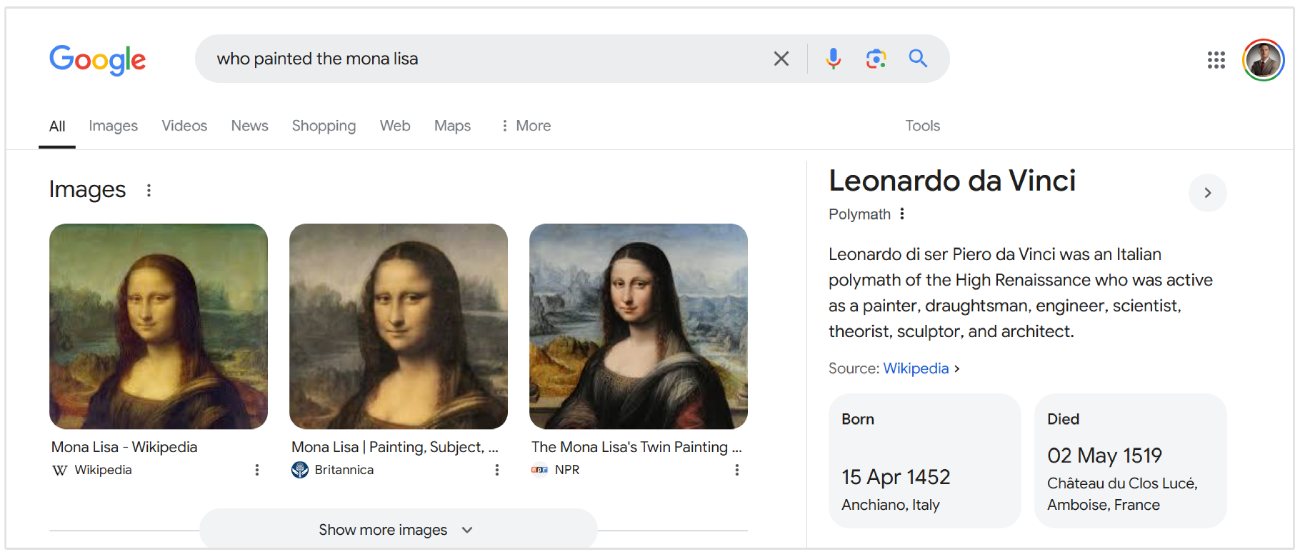
Entities also improve voice search accuracy, allowing AI assistants like Google Assistant to provide better answers based on meaning rather than just keywords.
What are the Different Types of Entities in SEO?
Entities in SEO can be categorized based on their nature and role in search engines. Here are the main types:
1. Named Entities
These are specific, identifiable entities with unique names. They typically belong to categories like:
- People (e.g., Warren Buffet, Taylor Swift)
- Places (e.g., New York, Eiffel Tower)
- Organizations (e.g., Google, NASA)
- Events (e.g., Olympics 2024, Super Bowl LVIII)
- Brands (e.g., Apple, Nike)
2. Conceptual Entities
These refer to abstract ideas, theories, or categories. They help Google understand broad topics and their relationships. Examples of these concepts include:
- Mathematical Concepts (e.g., Pythagorean Theorem)
- Scientific Theories (e.g., Theory of Relativity)
- Philosophical Ideas (e.g., Existentialism)
3. Object-Based Entities
These are physical, tangible things that exist in the real world, such as:
- Products (e.g., iPhone 15, Tesla Model S)
- Animals (e.g., Bengal Tiger, Golden Retriever)
- Books and Movies (e.g., Harry Potter, Inception)
4. Event-Based Entities
These entities represent things that happen at a specific time and place, such as:
- Historical Events (e.g., World War II, The Renaissance)
- Cultural Events (e.g., Coachella, Cannes Film Festival)
5. Digital Entities
These are entities that exist primarily online or in digital form, such as:
- Websites (e.g., Wikipedia, Reddit)
- Social Media Profiles (e.g., @Google on Twitter)
- Apps and Software (e.g., ChatGPT, Adobe Photoshop)
6. Medical & Health Entities
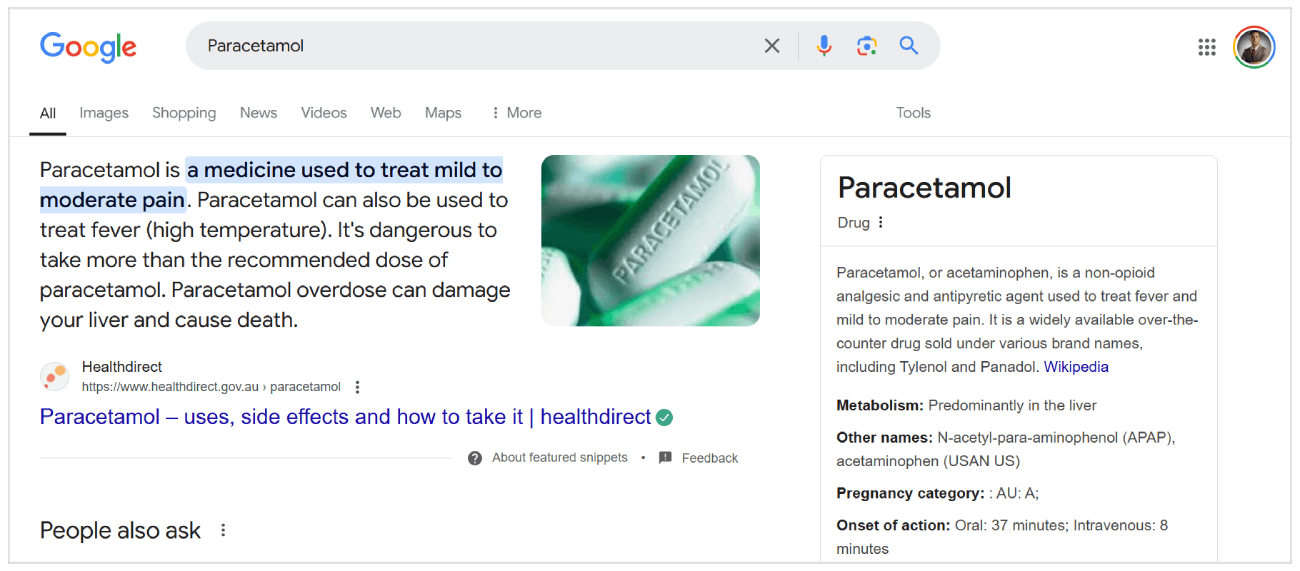
Google recognizes medical-related entities to provide accurate health information, including:
- Diseases and Conditions (e.g., Diabetes, COVID-19)
- Medications (e.g., Ibuprofen, Paracetamol)
- Symptoms (e.g., Fever, Headache)
7. Time-Based Entities
Entities that define time-related concepts, such as:
- Holidays & Observances (e.g., Christmas, Ramadan)
- Time Periods (e.g., 21st Century, Jurassic Era)
How to Optimize for Entities in SEO?
Optimizing for entities in SEO means helping search engines understand the topics, people, places, and things you mention on your website. Instead of just focusing on keywords, you should structure your content in a way that clearly defines entities and their relationships.
Here are some tips on how to do it:
1. Use Structured Data Markup
Structured data helps Google recognize and categorize entities on your website. By adding Schema.org markup, you can define entities like:
- Person (e.g., an author or business owner)
- Organization (e.g., your company or brand)
- Product (e.g., an item you sell)
- Event (e.g., a conference or webinar)
You’ll want to add schema markup to key website pages to help search engines better understand, categorize, and serve your content in search results.
Think of structured data as a translator for search engines.
- Brianna Strouse, SEO Manager at LevLane Advertising
For example, if you run a local restaurant, using LocalBusiness schema can help Google recognize your restaurant as an entity and display it in search results with rich snippets.
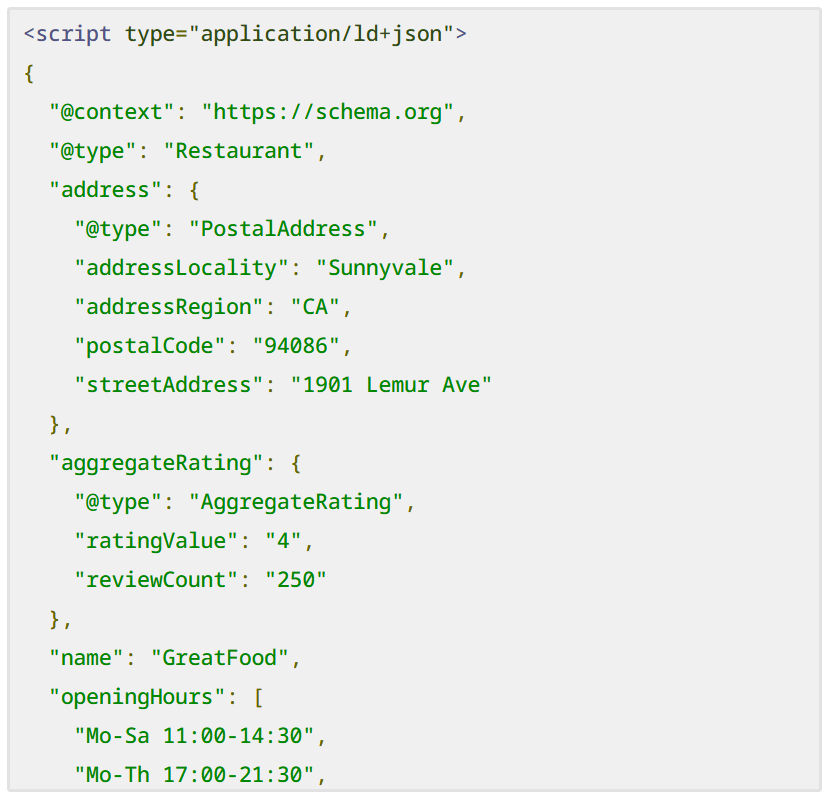
Jase Rodley is an independent SEO consultant and he also notes that schema markup is one of the best things you could be doing when it comes to optimizing for entity SEO.
You want Google to see your brand as an entity so you’ve got to feed it the right signals.
Start with structured data. Schema markup is a huge help here. It lets you define your entities clearly — whether it's a business, person, place, or event and lets Google know the relationships between them.
- Jase Rodley, Independent SEO Consultant
2. Build Strong Internal Linking
Entities are connected, and so should your content and web pages.
Link to related pages within your website to help Google understand relationships between topics.
I learned that entity optimization was key to my success at Create & Grow when I saw that Google really liked content that had strong topical links.
I organized specific topic clusters around passive income streams and linked them in a smart way through the architecture of our site.
- Georgi Todorov, Founder and CEO at Create & Grow
Try to use descriptive anchor text that includes the entity name or a related keyword.
For example, if you have a blog post about "The History of Tesla," link it to another post about electric cars to reinforce the connection.
3. Create Comprehensive Content on Entities
Google rewards content that fully explains an entity. To optimize:
- Cover multiple aspects of the entity (e.g., history, features, importance).
- Include relevant keywords and synonyms naturally.
- Use FAQs to answer common questions related to the entity.
For example, if you're writing about the Eiffel Tower, don’t just describe it—include details like its history, height, location, and famous facts.
4. Optimize for Google’s Knowledge Graph
To increase your chances of appearing in Google’s Knowledge Graph, make sure to:
- Be listed on Wikipedia or Wikidata (Google pulls entity data from these sources)
- Get mentions on high-authority websites (news sites, industry blogs)
- Maintain consistent NAP (Name, Address, Phone Number) data across the web if optimizing for a local business entity
5. Use High-Quality Images and Videos
Entities are often represented visually in search results.
Optimize images with descriptive file names and alt text.
Add structured data for images, products, and videos to help Google recognize them as part of an entity.
Use YouTube for video content, as it’s closely tied to Google’s search ecosystem.
6. Leverage Social Media and Brand Mentions
Google considers brand mentions as entity signals. To improve recognition:
- Keep your business name consistent across all social platforms.
- Engage in discussions related to your niche to increase visibility.
- Get featured in high-authority publications that Google trusts.
Search engines trust established sources. I’ve used strategic media placements, guest features, and expert quotes to position clients as industry leaders.
This not only improves SEO but helps them rank for their own names; securing their place in the Knowledge Graph.
- Mary Sahagun, Founder at TargetLink
7. Optimize for Voice Search and Conversational Queries
Since entities power voice search results, structure your content for natural language searches:
- Use question-based headings (e.g., "What is the tallest building in the world?")
- Write in a clear, conversational tone.
- Provide direct answers in short, simple sentences.
What is the Difference between Keywords and Entities in SEO?
Unlike keywords, which are just words or phrases, entities are real-world things that search engines connect in their database. They help Google understand content better and provide more accurate search results.
Wrapping Up
Instead of focusing only on keywords, Google now prioritizes entities—people, places, things, and concepts—and their relationships.
By implementing these strategies, you can improve search visibility, increase relevance, and future-proof your SEO efforts in a world where entities matter more than just keywords.










